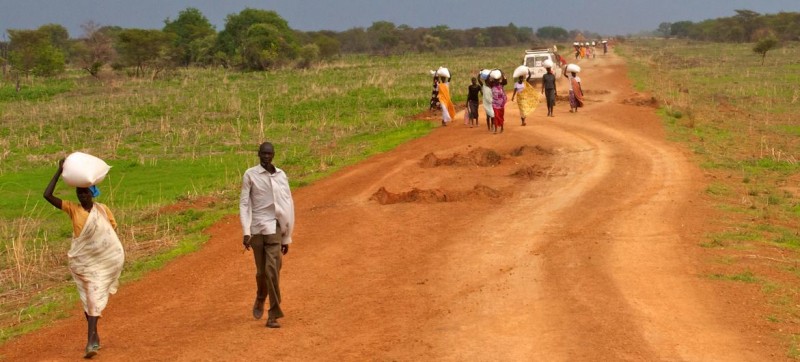Displaced people flee violence in Abyei, South Sudan. (file) The UN Humanitarian Coordinator in South Sudan on Wednesday strongly condemned the continued violence across the country, which is affecting the safety of civilians and humanitarian workers, constraining humanitarian access, and disrupting the delivery of aid and services to thousands of vulnerable people. In a statement, Sara Nyanti, condemned the killing of a nurse working with an international aid organization which took place on 10 February in Agok town, leaving several civilians injured, including aid workers. Reports indicate that some 70,000 people have been displaced by the fighting, and humanitarian operations, including healthcare services, have been temporarily suspended. Also on the same day, an aid worker was killed by crossfire during fighting in MirMir in Unity State, said Ms. Nyanti. Since 2013, 130 humanitarian workers have been killed while delivering aid and services, the vast majority of them South Sudanese nationals. Following a recent fact-finding visit to the country, UN human rights experts warned of increased political violence and polarization between communities across the world’s youngest country. Additionally, a centre designed as a safe space for women and girls was reportedly looted, a health and nutrition facility temporarily closed, and an access route serving up to to 500,000 people in need in Unity State has been jeopardized, according to the press release issued by the UN humanitarian affairs office, OCHA. A further incident occurred in Unity State, just two days later, when a clearly marked humanitarian vehicle came under fire on its way to a health facility, resulting in grave injury to three health workers.70,000 displaced
Aid and health facilities closed
Struggling to survive
According to OCHA, South Sudanese face the highest levels of food insecurity since independence in 2011 and the brutal civil conflict between rival factions began, in 2013.
The latest IPC analysis, indicates that between April and July last year, 7.2 million people were estimated to be at crisis phase, of which 2.4 million are at emergency level of need. Around 108,000 people in six counties, faced catastrophic levels of acute food insecurity.
“These appalling acts of violence against civilians and humanitarians must stop”, said Ms. Nyanti. “Every day, people in South Sudan are struggling to survive and violence has no place in a country determined to move forward towards peace.
“Attacks against civilians and humanitarians and their assets, along with the destruction and looting of aid supplies intended for the most vulnerable are unacceptable. They also severely impact our ability to deliver assistance”, Ms. Nyanti continued.
Safe environment needed
Committed to alleviate the suffering of people affected by violence, food insecurity, climate and health crisis in South Sudan, humanitarians risk their lives every day to provide much-needed aid to vulnerable people there.
Repeated violence and threats against humanitarians and their assets have resulted in the relocation of workers and the suspension of lifesaving activities in South Sudan.
According to OCHA, a total of 322 humanitarian workers were relocated in 2021 alone.
“We need a safe environment to operate so that we can focus on what matters most: helping people in need in South Sudan”, the UN humanitarian coordinator reiterated.
Expressing her condolences to the families of the aid workers who were killed in Agok and MirMir, Ms. Nyanti reminded that attacks against civilians and humanitarian assets constitute a grave violation of international humanitarian law.
The humanitarian community urged all parties to the conflict to respect international law and protect civilians and humanitarian personnel and assets, calling on authorities to conduct a full investigation into the deaths.




Comments are closed.